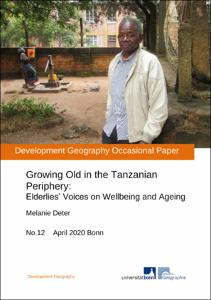Deter, Melanie: Growing Old in the Tanzanian Periphery : Elderlies’ Voices on Wellbeing and Ageing. Bonn: Department of Geography, University of Bonn, 2020. In: Development Geography Occasional Paper, 12.
Online-Ausgabe in bonndoc: https://hdl.handle.net/20.500.11811/8658
Online-Ausgabe in bonndoc: https://hdl.handle.net/20.500.11811/8658
@techreport{handle:20.500.11811/8658,
author = {{Melanie Deter}},
title = {Growing Old in the Tanzanian Periphery : Elderlies’ Voices on Wellbeing and Ageing},
publisher = {Department of Geography, University of Bonn},
year = 2020,
month = apr,
series = {Development Geography Occasional Paper},
volume = 12,
note = {This thesis explores different life situations of elderly people in rural Tanzania. It carves out how the process of ageing impacts these elderlies’ lives, highlights the heterogeneity within Africa’s older populations and thereby calibrates the “dominant narrative of Africa’s older people as homogeneously disadvantaged” (Aboderin 2017: 644). In order to do so, this thesis highlights the disparities in capacity and privilege that exist within this population by taking a relational perspective: it views the elderlies’ lives with regard to their life-courses, in relation to inter-generational aspects as well as in interconnections with social markers, particularly class and gender.
In rural Tanzania, many family structures change due to the out-migration of younger generations to urban centres. Thus, the elderlies “lives and well-being are fundamentally impacted by the emigration of their children” (King et al. 2017: 185). Applying a mobility perspective, this thesis is concerned with translocal (im)mobilities of elderlies’ families, especially with how care work and support are arranged within those translocal networks. The thesis further pays attention to the mobility of the ageing people and their bodies – to how ageing of the bodies impacts the elderlies’ interaction and movements through the environment and how this coins the elderlies’ everyday lives.
Not only in political terms, the elderly in Sub-Saharan Africa seem to be a marginalised group, but also in science, many scholars speak of a lack of research in this field (Maharaj 2013; Hoffman & Pype 2016; Cohen & Menken 2006). This thesis contributes to this research gap by presenting qualitative insights into some elderlies’ perceptions and experiences of ageing. Importantly, the starting point of this thesis is not the interest in the elderlies’ old age security alone but overcomes this vulnerability-oriented perspective on their lives: it highlights what actually matters to the elderlies – not only for their livelihood security but for their individual wellbeing.},
url = {https://hdl.handle.net/20.500.11811/8658}
}
author = {{Melanie Deter}},
title = {Growing Old in the Tanzanian Periphery : Elderlies’ Voices on Wellbeing and Ageing},
publisher = {Department of Geography, University of Bonn},
year = 2020,
month = apr,
series = {Development Geography Occasional Paper},
volume = 12,
note = {This thesis explores different life situations of elderly people in rural Tanzania. It carves out how the process of ageing impacts these elderlies’ lives, highlights the heterogeneity within Africa’s older populations and thereby calibrates the “dominant narrative of Africa’s older people as homogeneously disadvantaged” (Aboderin 2017: 644). In order to do so, this thesis highlights the disparities in capacity and privilege that exist within this population by taking a relational perspective: it views the elderlies’ lives with regard to their life-courses, in relation to inter-generational aspects as well as in interconnections with social markers, particularly class and gender.
In rural Tanzania, many family structures change due to the out-migration of younger generations to urban centres. Thus, the elderlies “lives and well-being are fundamentally impacted by the emigration of their children” (King et al. 2017: 185). Applying a mobility perspective, this thesis is concerned with translocal (im)mobilities of elderlies’ families, especially with how care work and support are arranged within those translocal networks. The thesis further pays attention to the mobility of the ageing people and their bodies – to how ageing of the bodies impacts the elderlies’ interaction and movements through the environment and how this coins the elderlies’ everyday lives.
Not only in political terms, the elderly in Sub-Saharan Africa seem to be a marginalised group, but also in science, many scholars speak of a lack of research in this field (Maharaj 2013; Hoffman & Pype 2016; Cohen & Menken 2006). This thesis contributes to this research gap by presenting qualitative insights into some elderlies’ perceptions and experiences of ageing. Importantly, the starting point of this thesis is not the interest in the elderlies’ old age security alone but overcomes this vulnerability-oriented perspective on their lives: it highlights what actually matters to the elderlies – not only for their livelihood security but for their individual wellbeing.},
url = {https://hdl.handle.net/20.500.11811/8658}
}






